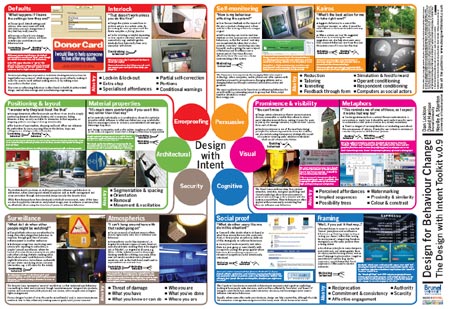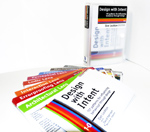â– How to influence user behaviour
â– 12 inspirational design patterns in poster form (plus 35 more)
â– Grouped into 6 ‘lenses’ giving different perspectives

Download the poster (it’s a 1.3 MB PDF) – now also includes A4 pages for each lens, for easier printing [Alternative link]
 ***Please note***
***Please note***
This is an old version of the toolkit – the newer Design with Intent toolkit v.1.0 is also available and is much better!
Start with the problem
You have a product, service or environment–a system–where users’ behaviour is important to it working properly (safely, efficiently), so ideally you’d like people to use it in a certain way.
Or maybe you have a system where it would be desirable to alter the way that people use it, to improve things for users, the people around them, or society as a whole.
How can you modify the design, or redesign the system, to achieve this: to influence, or change users’ behaviour?
The design patterns
The Design with Intent Toolkit aims to help designers faced with ‘design for behaviour change’ briefs. The poster* features 12 design patterns which recur across design ï¬elds (interaction, products, architecture), and there are also 35 more detailed here on the website. Some of the names will be unfamiliar, but we hope the patterns and examples will be understandable, and inspire your own concepts.
Think about how you might apply the ideas to your brief, and what could work given what you know about the problem. If you get stuck, try combining ideas from different patterns: many real examples can be thought of as using two or more patterns.
The patterns are grouped into six ‘lenses’, each offering a different worldview on design and behaviour. The lenses allow you to ask “How might someone else approach the problem?” and ought to help you think outside your initial perspective (or your client’s):
Architectural lens
- Positioning & layout
- Material properties
- Segmentation & spacing
- Orientation
- Removal
- Movement & oscillation
Errorproofing lens
- Defaults
- Interlock
- Lock-in & lock-out
- Extra step
- Specialised affordances
- Partial self-correction
- Portions
- Conditional warnings
Persuasive lens
- Self-monitoring
- Kairos
- Reduction
- Tailoring
- Tunnelling
- Feedback through form
- Simulation & feedforward
- Operant conditioning
- Respondent conditioning
- Computers as social actors
Visual lens
- Prominence & visibility
- Metaphors
- Perceived affordances
- Implied sequences
- Possibility trees
- Watermarking
- Proximity & similarity
- Colour & contrast
Cognitive lens
- Social proof
- Framing
- Reciprocation
- Commitment and consistency
- Affective engagement
- Authority
- Scarcity
Security lens
- Surveillance
- Atmospherics
- Threat of damage
- What you have
- What you know or can do
- Who you are
- What you’ve done
- Where you are
A different approach: using the patterns as questions
Nedra Kline Weinreich, author of Hands-on Social Marketing, has created a clever Design Approach for Behaviour Change worksheet based on the 12 patterns from the Design with Intent poster, by re-framing each of the patterns as a question. This is a great idea, turning the patterns into cues for you to think about relative to your problem. After working through the questions, you pretty much end up with a set of possible solutions.
What sort of behaviour are you trying to achieve?
See the next page…
*Lockton, D., Harrison, D.J., Stanton, N.A. Design for Behaviour Change: The Design with Intent Toolkit v.0.9, Uxbridge: Brunel University 2009 (ISBN 978-1-902316-6-1 print; 978-1-902316-63-5 eBook), http://www.designwithintent.co.uk
____________________
The Design with Intent Toolkit v0.9 by Dan Lockton, David Harrison and Neville A. Stanton
Introduction | Behaviour | Architectural lens | Errorproofing lens | Persuasive lens | Visual lens | Cognitive lens | Security lens